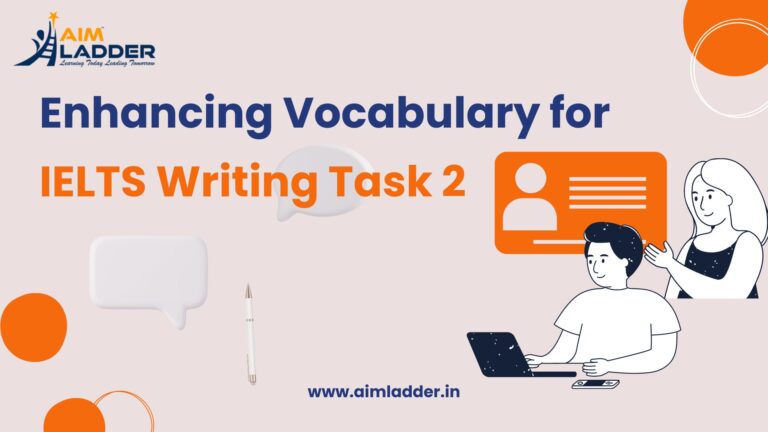- Services
-
-
Test Preparation
-
Study Abroad Services
Visitor, Tourist & Dependent Visas
-
-
-
- Study Destinations
-
-
Top Study Destinations
-
-
-
-
- About Us
- Contact Us
- Blog
Mastering Advanced Vocabulary for IELTS Speaking Success

Preparing for the IELTS speaking test requires not only fluency but also a rich repertoire of advanced vocabulary to convey nuanced meanings and impress examiners. Here’s a comprehensive guide to essential advanced vocabulary that will elevate your speaking skills and boost your chances of achieving a high band score.
1. Articulating Trends and Fluctuations
Effectively discussing trends and fluctuations requires precise vocabulary. Enhance your responses with these sophisticated terms:
- Surge: Witness a surge in, experience a surge in
- Skyrocket: Prices skyrocketed, demand skyrocketed
- Plummet: Profits plummeted, temperatures plummeted
- Fluctuate: Markets fluctuate, opinions fluctuate
- Peak: Reach its peak, at the peak of, peak performance
- Trough: Hit a trough, economic trough, low point
Example Sentence: “The housing market has experienced a dramatic surge in prices over the past year.”
2. Expressing Opinions with Confidence
Demonstrate clarity and conviction in your opinions using advanced vocabulary:
- Eminent: An eminent scholar, an eminent figure
- Persuasive: Present a persuasive argument, be persuasive
- Compelling: Make a compelling case, compelling evidence
- Insightful: Provide insightful analysis, offer insightful comments
- Profound: A profound impact, profound implications
- Intriguing: Raise intriguing questions, an intriguing idea
Example Sentence: “From an economic standpoint, investing in renewable energy sources offers profound benefits for future generations.”
3. Describing People, Places, and Experiences
Use evocative language to vividly describe people, places, and experiences:
- Exquisite: Exquisite cuisine, an exquisite view
- Pristine: Pristine beaches, pristine condition
- Enchanting: An enchanting city, an enchanting story
- Spectacular: Spectacular scenery, a spectacular performance
- Majestic: Majestic mountains, a majestic castle
- Intricate: An intricate design, intricate details
Example Sentence: “The ancient ruins of Machu Picchu offer an enchanting glimpse into the history of the Inca civilization.”
4. Analyzing Advantages and Disadvantages
Delve into the nuances of advantages and disadvantages with sophisticated vocabulary:
- Pivotal: A pivotal moment, play a pivotal role
- Paramount: Paramount importance, of paramount concern
- Invaluable: Provide invaluable insights, offer invaluable experience
- Detrimental: Have a detrimental effect, detrimental consequences
- Conducive: Conducive to growth, conducive environment
- Lucrative: A lucrative opportunity, lucrative business
Example Sentence: “While technological advancements have been pivotal in improving communication, they have also posed detrimental challenges to personal privacy.”
5. Explaining Causes and Effects
Effectively articulate causes and effects using advanced vocabulary:
- Catalyst: Serve as a catalyst for change, a catalyst for growth
- Precipitate: Precipitate a crisis, precipitate a decision
- Manifest: Manifest itself, manifest symptoms
- Spur: Spur economic growth, spur innovation
- Underpin: Underpinning principles, underpin the argument
- Exacerbate: Exacerbate the situation, exacerbate tensions
Example Sentence: “Climate change has exacerbated natural disasters, manifesting in more frequent and severe hurricanes and wildfires.”
6. Illustrating with Examples
Enhance your examples with sophisticated vocabulary:
- Eloquent: An eloquent speaker, deliver an eloquent speech
- Vivid: Paint a vivid picture, provide vivid examples
- Nuanced: Offer nuanced insights, a nuanced understanding
- Illustrative: Provide illustrative examples, illustrative case study
- Convey: Convey a message, convey emotions
- Evoke: Evoke memories, evoke strong emotions
Example Sentence: “His eloquent argument on social justice evoked a powerful response from the audience.”
7. Conveying Emotions and Feelings
Use nuanced vocabulary to express emotions effectively:
- Ecstatic: Ecstatic joy, be ecstatic about
- Melancholy: Feel a sense of melancholy, melancholy atmosphere
- Exhilarated: Exhilarated feeling, exhilarated by
- Apprehensive: Apprehensive about the future, feel apprehensive
- Resilient: Show resilience, resilient spirit
- Poignant: A poignant moment, poignant reminder
Example Sentence: “I felt a poignant sense of nostalgia as I revisited my childhood home.”
Conclusion
Mastering advanced vocabulary is essential for excelling in the IELTS speaking test. These sophisticated words and phrases will not only enhance your communication skills but also impress examiners with your linguistic proficiency and depth of expression. Practice incorporating these vocabulary items into your speaking practice to confidently navigate any topic and achieve your desired band score.





